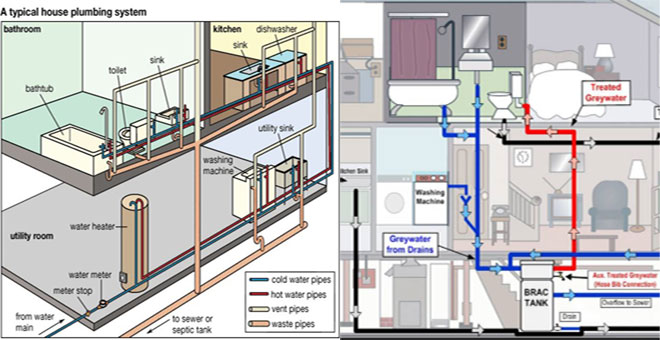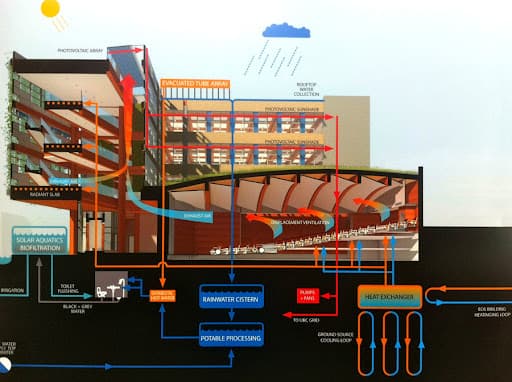Just how do you feel about The Inner Workings of Your Home's Plumbing?

Recognizing just how your home's plumbing system works is essential for every single house owner. From delivering tidy water for alcohol consumption, food preparation, and showering to safely removing wastewater, a properly maintained plumbing system is important for your family's health and convenience. In this detailed guide, we'll discover the complex network that makes up your home's pipes and offer tips on upkeep, upgrades, and dealing with common concerns.
Introduction
Your home's plumbing system is more than simply a network of pipes; it's an intricate system that ensures you have accessibility to clean water and reliable wastewater removal. Recognizing its elements and just how they collaborate can help you stop costly repair work and guarantee whatever runs smoothly.
Fundamental Components of a Plumbing System
Pipelines and Tubing
At the heart of your pipes system are the pipes and tubes that carry water throughout your home. These can be constructed from various products such as copper, PVC, or PEX, each with its advantages in regards to toughness and cost-effectiveness.
Components: Sinks, Toilets, Showers, etc.
Components like sinks, commodes, showers, and tubs are where water is made use of in your home. Comprehending how these fixtures attach to the plumbing system assists in diagnosing issues and intending upgrades.
Valves and Shut-off Points
Shutoffs regulate the circulation of water in your pipes system. Shut-off valves are vital during emergencies or when you require to make repairs, enabling you to separate parts of the system without disrupting water flow to the whole home.
Water System
Key Water Line
The major water line connects your home to the metropolitan water supply or a private well. It's where water enters your home and is distributed to numerous components.
Water Meter and Stress Regulatory Authority
The water meter steps your water use, while a stress regulator makes sure that water moves at a secure pressure throughout your home's plumbing system, stopping damages to pipes and components.
Cold Water vs. Warm water Lines
Understanding the distinction in between cold water lines, which provide water directly from the primary, and hot water lines, which carry heated water from the water heater, helps in troubleshooting and planning for upgrades.
Drainage System
Drain Piping and Traps
Drain pipelines carry wastewater far from sinks, showers, and toilets to the sewer or septic system. Catches protect against sewage system gases from entering your home and likewise catch debris that could create blockages.
Ventilation Pipelines
Ventilation pipes enable air into the drainage system, avoiding suction that could slow water drainage and trigger traps to empty. Correct air flow is crucial for keeping the stability of your pipes system.
Relevance of Appropriate Drain
Ensuring proper water drainage stops backups and water damages. Consistently cleaning drains and keeping traps can prevent pricey repair services and prolong the life of your plumbing system.
Water Heater
Sorts Of Water Heaters
Water heaters can be tankless or traditional tank-style. Tankless heating systems heat water as needed, while storage tanks save heated water for prompt use.
Upgrading Your Pipes System
Reasons for Updating
Upgrading to water-efficient components or replacing old pipelines can enhance water quality, minimize water bills, and boost the value of your home.
Modern Pipes Technologies and Their Benefits
Discover technologies like clever leak detectors, water-saving commodes, and energy-efficient water heaters that can conserve money and minimize environmental effect.
Cost Factors To Consider and ROI
Compute the in advance expenses versus long-term financial savings when considering pipes upgrades. Numerous upgrades pay for themselves via decreased energy expenses and less repairs.
How Water Heaters Connect to the Pipes System
Understanding how water heaters attach to both the cold water supply and hot water circulation lines helps in identifying concerns like insufficient warm water or leakages.
Maintenance Tips for Water Heaters
Regularly flushing your hot water heater to remove sediment, inspecting the temperature setups, and evaluating for leaks can extend its life-span and boost energy effectiveness.
Usual Plumbing Issues
Leakages and Their Reasons
Leaks can happen due to aging pipelines, loose installations, or high water stress. Dealing with leaks immediately protects against water damages and mold development.
Clogs and Clogs
Clogs in drains pipes and commodes are typically brought on by flushing non-flushable things or a buildup of oil and hair. Using drain displays and being mindful of what decreases your drains can avoid blockages.
Indicators of Plumbing Issues to Expect
Low water pressure, slow-moving drains, foul odors, or unusually high water expenses are indicators of potential plumbing issues that need to be addressed promptly.
Plumbing Upkeep Tips
Normal Evaluations and Checks
Schedule annual pipes examinations to catch problems early. Try to find indicators of leaks, rust, or mineral accumulation in taps and showerheads.
Do It Yourself Upkeep Tasks
Straightforward jobs like cleansing faucet aerators, checking for bathroom leakages making use of color tablets, or insulating exposed pipes in chilly environments can stop significant pipes issues.
When to Call a Professional Plumber
Know when a plumbing concern calls for professional competence. Trying intricate fixings without correct expertise can lead to even more damage and higher repair service prices.
Tips for Lowering Water Use
Straightforward behaviors like taking care of leakages promptly, taking shorter showers, and running full loads of laundry and dishes can conserve water and lower your utility costs.
Eco-Friendly Pipes Options
Take into consideration lasting pipes products like bamboo for floor covering, which is durable and eco-friendly, or recycled glass for countertops.
Emergency situation Readiness
Actions to Take During a Plumbing Emergency
Know where your shut-off shutoffs lie and just how to switch off the water system in case of a ruptured pipe or major leak.
Importance of Having Emergency Situation Get In Touches With Useful
Keep call info for local plumbings or emergency solutions conveniently offered for quick response throughout a pipes dilemma.
Environmental Impact and Preservation
Water-Saving Components and Home Appliances
Mounting low-flow taps, showerheads, and bathrooms can considerably reduce water use without compromising performance.
DIY Emergency Situation Fixes (When Appropriate).
Short-lived fixes like making use of air duct tape to patch a dripping pipeline or placing a pail under a leaking faucet can minimize damages up until a professional plumbing professional shows up.
Conclusion.
Recognizing the composition of your home's pipes system equips you to maintain it properly, saving time and money on repair services. By complying with normal upkeep routines and remaining informed concerning contemporary pipes innovations, you can ensure your pipes system operates effectively for years ahead.
HOW YOUR PLUMBING SYSTEM WORKS
Which Pipes Do What?
Blue lines = fresh water supply entering the building Red lines = hot water supply entering the building Grey lines = pipes carrying waste away from the building and venting pipes carrying gases away from the building (through the roof) YOUR MAIN PLUMBING SYSTEMS
There are two main plumbing systems that support your home s basic plumbing needs one that brings clean water into your home, and one that sends dirty water away from your home. Connected to the toilet, bath, shower, and other faucets in your home, these two systems keep your water flowing in the right directions.
ACCESSING FRESH WATER
Fresh and clean water is brought into your home through the main water supply line . Filtered through one pipe, this water is pressured to flow into the various fixtures in your home at any given time.
This water can be sourced from a well located on your property, a pond or river (mostly cottages), or, as in most cases, from the city s municipal water treatment centre. However, it is important to note that water that is untreated, such as the water siphoned from ponds or rivers, may not be safe to drink. Personal water supplies always need to be treated for hardness and contaminants before consumed.
MUNICIPAL WATER SUPPLIES
Improve taste and odour Remove sediment Eliminate hardness Reduce chlorine COLD WATER SUPPLY VS. HOT WATER SUPPLY
Cold water flows into your home or building through the service line, which then distributes hot or cold water to your fixtures. This line is most commonly run through a central column that runs floor to floor. Hot water runs in short and straight pipes as the longer the pipeline, the more heat that will be lost in the transfer. Having shorter pipes also allows residents to access hot water more quickly.
WASTE WATER SYSTEM
Your wastewater system is divided into two parts pipes that send wastewater away from your home and venting pipes that send sewer gas away from your home. Sewage water travels through pipes that flush the water and waste towards local sewers that are operated and managed by your city or town. Most sewer systems rely on gravity to move the wastewater to where it needs to go.
The further away from your toilet or sink, the larger wastewater pipes become. This allows for waste to be disposed of from various parts of your home or business at once without pipe blockages. The angle and flow of these pipes are also essential for keeping your waste pipes clear of build up.
https://harrisplumbing.ca/how-your-home-plumbing-system-works/

I was guided to that editorial about The Inner Workings of Your Home's Plumbing from a friend on our other web blog. Are you aware of somebody else who is excited by the subject? Why not share it. Thanks so much for going through it.
Book